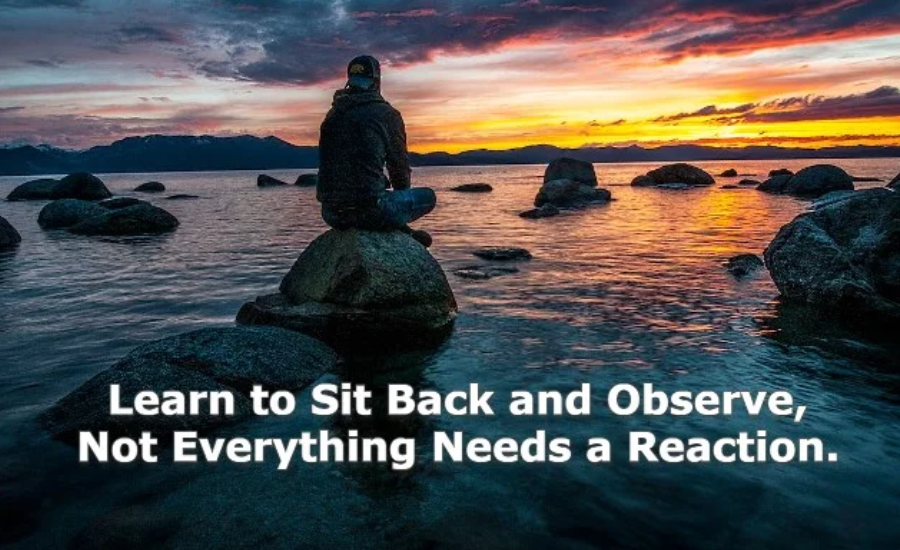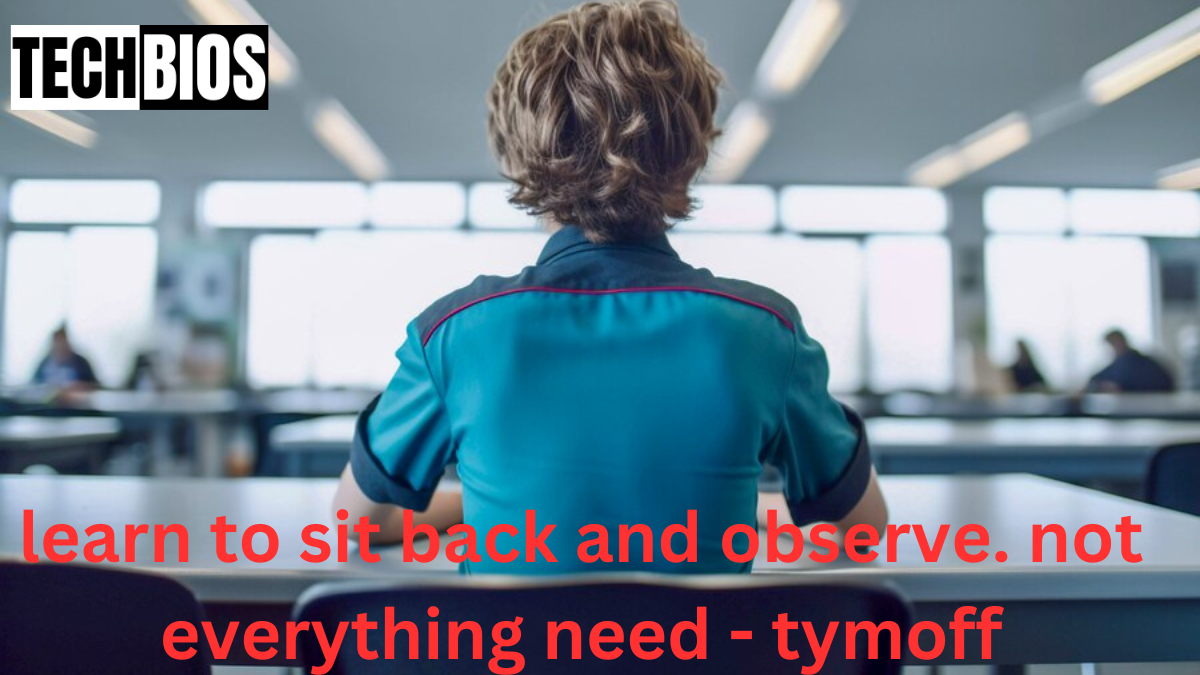Introduction: The learn to sit back and observe. not everything need – tymoff
In our learn to sit back and observe. not everything need – tymoff world, we often rush from one task to another, bombarded by noise and distractions. We feel the pressure to react quickly, make decisions on the fly, and stay constantly engaged. But what if I told you that sometimes the best course of action is simply to take a step back? Learning to sit back and observe can unlock insights you never knew existed. It’s about pausing amid chaos—allowing yourself the space to notice details that may otherwise slip through your fingers. Embracing this mindset not only enhances your understanding but also enriches your life in unexpected ways. So let’s dive into why observation is an essential skill worth mastering!
What Does it learn to sit back and observe. not everything need – tymoff?
To sit learn to sit back and observe. not everything need – tymoff a step away from the chaos of daily life. It’s about creating space for reflection instead of rushing in to engage with every situation.
This practice encourages mindfulness. Instead of reacting impulsively, you become an active listener and learner. You begin to notice subtle details that often go unnoticed amid distractions.
Observation allows for deeper understanding. By watching interactions or analyzing environments, insights surface organically.
When you choose learn to sit back and observe. not everything need – tymoff over immediate action, you give yourself the opportunity to process information more thoroughly.
It’s a shift from being constantly engaged to allowing moments of stillness where clarity can emerge naturally. Embracing this approach fosters patience and wisdom in decision-making, paving the way for thoughtful responses rather than hasty reactions.
The Benefits of learn to sit back and observe. not everything need – tymoff
Observing the world learn to sit back and observe. not everything need – tymoff us opens doors to new insights. It sharpens our awareness and helps us understand nuances often missed in a rush.
When we take time to observe, we enhance our decision-making skills. Careful attention leads to better judgments based on real data rather than assumptions or hasty conclusions.
Observation also cultivates empathy. By watching how others interact, we gain a deeper appreciation of their experiences and emotions. This understanding fosters connections that strengthen relationships.
Moreover, it sparks creativity. Inspiration can stem from simply noticing details in everyday life. Those little moments might become the seeds for innovative ideas or solutions.
Observation promotes mindfulness. Being present allows us to enjoy simple pleasures and reduces stress by anchoring our thoughts in the here and now.
How to Practice the Art of V

To practice the art of learn to sit back and observe. not everything need – tymoff , start by slowing down. Take a moment to breathe and focus on your surroundings. Notice the details that often go overlooked: colors, shapes, and textures.
Engage your senses fully. What do you hear? Smells can evoke memories or emotions—take note of them.
Try journaling about what you observe each day. This exercise sharpens your awareness and helps solidify your experiences in memory.
Limit distractions when you’re out in public spaces. Put away your phone for a while; it allows you to be present and truly see what’s happening around you.
Join mindfulness exercises or meditation sessions that encourage observational skills. These practices cultivate an inner calmness, enhancing clarity in how we perceive our environment without judgment or bias.
Challenge yourself with new environments frequently. Different settings offer fresh perspectives waiting to be discovered through careful observation.
Examples of When learn to sit back and observe. not everything need – tymoff
learn to sit back and observe. not everything need – tymoff can work wonders in various everyday situations. For instance, think about the workplace. Instead of diving headfirst into discussions, taking a moment to listen can reveal hidden dynamics and unspoken concerns.
In social settings, standing back allows you to gauge relationships and understand different perspectives. You might notice subtle cues that words alone miss.
Consider outdoor activities like hiking or nature watching. Observing your surroundings enhances appreciation for wildlife and landscapes you might otherwise overlook.
Even during family gatherings, stepping aside offers fresh insights into interactions among loved ones. It fosters deeper connections when we truly see each other.
V plays a crucial role in learning new skills. Watching others perform tasks reveals techniques that instructions may not convey fully. Embracing this practice opens doors to growth and understanding across countless scenarios.
The Pitfalls of Not learn to sit back and observe. not everything need – tymoff

When we rush through life, learn to sit back and observe. not everything need – tymoff the moments around us, we miss vital cues. Skipping observation can lead to misunderstandings in our relationships. We may misinterpret emotions or overlook unspoken needs.
In professional settings, a lack of observation often results in missed opportunities. Failing to notice team dynamics can hinder collaboration and innovation.
Moreover, neglecting to observe the world can stifle creativity. Inspiration often hides in everyday details that require attention. Without this awareness, ideas may stagnate.
Additionally, not observing our surroundings makes it challenging to learn from experiences. Each moment holds lessons; ignoring them means repeating mistakes instead of growing.
Being blind to what’s happening around us creates a disconnect between ourselves and others. Emotional intelligence diminishes when we fail to engage with the present moment fully.
Conclusion: Embracing the Power of Observation in Everyday Life
Embracing the power of observation can transform how we experience our daily lives. When you learn to sit back and observe. not everything need – tymoff and observe, you’re not just passively watching; you’re engaging with the world in a deeper way. This practice allows for greater awareness of your surroundings, emotions, and interactions.
By stepping away from the constant urge to react or intervene, you open yourself up to understanding different perspectives. You might discover new insights about people and situations that were previously hidden from view.
This mindful approach encourages patience and reflection. It helps cultivate an appreciation for life’s subtleties—those small moments that often go unnoticed when we rush through our days.
So next time you’re tempted to jump into action or share your opinion right away, consider taking a moment to simply observe instead. learn to sit back and observe. not everything need – tymoff and observe because not everything needs immediate attention or response. The art of observation can enhance relationships, foster personal growth, and lead you toward a more thoughtful existence.
Make it a habit to practice this skill regularly; you’ll find its benefits extending far beyond what you’d expect.
You May Also Read
Australian Men’s Cricket Team vs India National Cricket Team Match Scorecard
South Africa National Cricket Team vs Australian Men’s Cricket Team Standings
India National Cricket Team vs Netherlands National Cricket Team Match Scorecard




